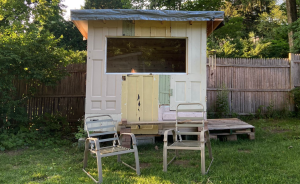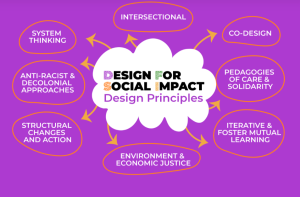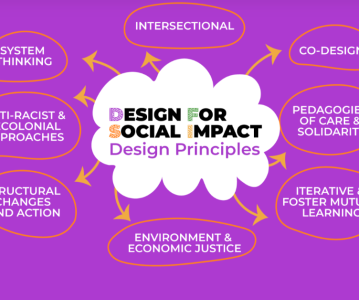Interviewing Techniques- A Reflective Practice
Background / Pre-Interview
As part of our course MSN Media Strategies and Methodologies-HT24, I wanted to deepen further my understanding of what a reflective and reflexive practice could and should be for practitioners within development studies. Through most of our course reading lists and online and offline resources, I have repeatedly been met with urgent calls for behavioural and systemic change. A practice of reflection and reflexivity with a focus on care and solidarity is mentioned by both scholars and practitioners alike as deeply needed and called for. (Geoghegan, G., 2024) Why is this? My wordcount won’t allow me to further this line of investigation here. If you are interested, please see my blog post from October titled “How can DevCom students develop “the necessary criticality” in order to become ‘good’ practitioners in the field? “(Geoghegan, G., 2024)
My thought is that this kind of learning and practice fits perfectly within a university context, where there is both the time and the safe space to explore one’s own practice and intentions. In academia, financial and time constraints are often less pressing compared to the practical challenges faced in the field. My professors have put a lot of great and extensive work into the reading list and lectures. However, I would love to see practical pedagogical sessions incorporated into the syllabus. At the very least, having it as an offering before writing our thesis, I believe, would be a good idea. With this in mind, I decided to talk to two people who have spent much time thinking about this subject.
My interviewees
In-person
My first interviewee was Karen Nordstrom, a Research Affiliate and Policy Program Co-Director for Food Solutions New England. Her fields (!) of expertise lie in Agroecology, pedagogy, participatory evaluation, educational action research and contemplative studies. As we live in the same city, I invited her to my backyard, where I have a DIY sauna and ice plunge. This would be a relaxing and open environment where we could sweat and chat.

(my D.I.Y sauna)
Zoom interview
My second interviewee was Jessica Oddy. I first learned about her on The Development Hub podcast when, back in May 2024, she talked about co-design, care and solidarity in social impact research projects (The Development Hub, May 2024). Oddy runs the newly set up Design for Social Impact Lab in the UK, whose work is “rooted in our foundational values of anti-oppression, intersectionality, and justice….Our mission is to empower you to use design as a catalyst for social good.” (https://www.designforsocialimpact.io/store, 2024).

(Screenshot from the website: designforsocialimpact.io/store, 2024)
I reached out to Oddy through both her website and LinkedIn. She responded very quickly and was happy to be interviewed. She accommodated our time differences and agreed to interview Zoom. Ahead of the interviews, I researched all the relevant literature accessible from Canvas.
Interview
For my interviewees, I designed three questions that left room for elaboration, speculation, and further investigation. I asked in advance if they would be OK with me recording the interview, and both agreed. I recorded the in-person interview with Nordstrom using my phone’s recording app, and with Oddy, we used the recording on Zoom.
Both interviews started with me introducing them and their work. I then used the following paragraph as a springboard for the interview, which I had shared beforehand with each of them.
“As we enter the fourth decade of the 21st century, communicating development has become increasingly complex. Amid climate crises, economic inequality, and ideological divides, the concept of “development” seems to be unravelling. There are growing concerns about the persistence of colonial mindsets in the sector. How can development practitioners move beyond rhetoric to cultivate a genuinely anti-oppressive, reflexive practice? Could personal reflection and self-awareness help foster a more equitable and just environment within which ‘good’ development work can be carried out? Could and should this happen before we enter the workforce? If so, what would/could this look like?”
I used the following questions to guide our conversation during the actual interviews, which I also shared before the interview.
- Please share a little about your background and personal experiences and how these have come to shape/ affect you and your work.
- What are your thoughts on incorporating reflexive and reflective practices into the university curriculum, not just theoretical but also practical teachings? What would/could this look like? What are your thoughts on this?
- Is there anything else you would like to share about how development studies can better prepare students for the challenges they will face in the field? Or what does development need to secure its future as a field.
These questions were meant as anchors to keep both myself and the interviewee on track and subject, but I was also keen to allow space for both Nordstrom and Oddy to elaborate and free flow.
Post-Interview Reflection
With Norstrom, it felt less time-pressured as we had set aside a whole evening for the interview (you can’t rush a sauna and ice plunge). It also helped that we had met previously and had energetically hit it off. I felt we connected in person quickly, and there was a lovely, relaxed atmosphere. Recording proved trickier, as my two young children decided they wanted to be part of the experience and kept running around us while we were talking. Luckily for me, Nordstrom, herself a mother, found this endearing rather than annoying.
Interviewing Oddy could have been more successful regarding rapport. Two factors led to this: firstly, our meeting on Zoom was the first time we saw and talked to each other, and secondly, online meetings are always less personal than face-to-face meetings. This is because it’s harder to get non-verbal cues from a person through a screen, where the only visible parts are the person’s head and neck. On top of this, the internet connection wasn’t great, and so it was a bit pixelated. Despite this, Oddy was a great person to talk to, and she is very professional and easygoing. I was also much more conscious about timings with Oddy than with Nordstrom, as I knew Oddy had a hectic schedule. In my initial email, I promised to take at most 40 min of her time. I hoped this would convince her to accept my request to talk to me. We kept to the time, but I wish we had had more, as I wanted to continue our conversation.
One of the key insights for me during my talk with Oddy, which had been a seed when reaching out to her, was that I wanted to propose to my professors and the university that Oddy and Design for Social Impact come and do some work with us. During the interview, Oddy said, “…one of the things that I definitely didn’t have access to when I was in my degree, but it’s something [that] we do…in our design for social impact course, is…spend…time…doing critical self-reflection, and thinking about…who [actually are you]? What are you bringing to this work… What are the things that you are actually trained to do? What are the things that you probably shouldn’t be doing [and also unpacking] why…you want to do development studies?” (Oddy, J., personal communication, November 7, 2024).
Reflecting on her words, what feels lacking in my Masters degree is this practical practice as part of our syllabus. What a great resource and skill to receive at university, even for practitioners already working in the field. What we read in books and hear in lectures is essential, but reflecting on how and why we are doing what we do and to what end is equally important. Could there be room for Oddy and the Design for Social Impact Lab team to come and do a pilot at Malmö University? In particular, before the thesis, I would find this type of course very beneficial. Food for thought, perhaps?
References
Geoghegan, G., (2024, October) How can DevCom students develop “the necessary criticality” in order to become ‘good’ practitioners in the field? Trouble in Development Paradise and What To Do About It. https://wpmu.mau.se/msm24group7/2024/10/09/how-can-devcom-students-develop-the-necessary-criticality-in-order-to-become-good-practitioners-in-the-field/
Holstein, J. A., & Gubrium, J. F. (2011). Constructing Meaning Within the Interview. In The Active Interview. SAGE Publications. https://doi.org/10.4135/9781412986120
Holstein, J. A., & Gubrium, J. F. (2011). Introduction. In The active interview. SAGE Publications. https://doi.org/10.4135/9781412986120
Holstein, J. A., & Gubrium, J. F. (2011). Multivocality and Multiple Respondents. In The Active Interview. SAGE Publications. https://doi.org/10.4135/9781412986120
Holstein, J. A., & Gubrium, J. F. (2011). Rethinking interview procedures. In The active Interview. SAGE Publications. https://doi.org/10.4135/9781412986120
Irvine, A., Drew, P., & Sainsbury, R. (2012). “Am I not answering your questions properly?” Clarification, Adequacy, and Responsiveness in Semi-structured Telephone and Face-to-face interviews. Qualitative Research, 13(1), 87–106. SAGE Publications. https://doi.org/10.1177/1468794112439086
The Development Hub. (2024, May). Episode 35: Co-design, Care and Solidarity in Social Impact Research Projects [Audio podcast episode]. DevHub Podcast. https://devhubuk.org/podcast/
Trier-Bieniek, A. (2012). Framing the Telephone Interview As Part of Participant-Central Tool for Qualitative Research: A Methodological Discussion. Qualitative Research. SAGE Publications. https://doi.org/10.1177/1468794112439005

